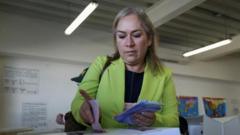With the upcoming election on May 3, Prime Minister Anthony Albanese finds himself navigating a political landscape rife with challenges, from the fallout of Cyclone Alfred to rising living costs and a contentious Indigenous referendum that has left many disillusioned. Albanese's ambitious agenda during his tenure, primarily focused on climate action, economic stability, and Indigenous affairs, has been significantly impacted by unforeseen events and voter dissatisfaction. The recent rejection of the Indigenous Voice to Parliament, alongside persistent economic issues, has led to a tightening race against opposition leader Peter Dutton, raising the possibility of a hung parliament.
Albanese's Election Challenges: A Nation at the Crossroads

Albanese's Election Challenges: A Nation at the Crossroads
As Australia approaches a crucial election, Prime Minister Anthony Albanese faces daunting challenges amidst a climate of uncertainty and rising discontent.
As the election looms, Albanese's government wrestles not just with issues of governance but with the broader question of its role in a changing political landscape where traditional party loyalties are faltering. Independent candidates and minor parties are gaining traction, reflecting a growing demand for alternative solutions. With mandatory voting in place, the stakes remain high, and both parties will need to engage with an electorate seeking effective leadership in uncertain times.
As Australia gears up for one of its most competitive elections, the interplay between local grievances and global uncertainties will likely shape the mood of the voters, ultimately influencing the future direction of the nation and its government.
The Albanese administration is now faced with the formidable task of redefining its narrative and reconnecting with an increasingly skeptical populace before going to the polls. The journey ahead promises to be intense, with Australia's political future hanging in the balance.
As Australia gears up for one of its most competitive elections, the interplay between local grievances and global uncertainties will likely shape the mood of the voters, ultimately influencing the future direction of the nation and its government.
The Albanese administration is now faced with the formidable task of redefining its narrative and reconnecting with an increasingly skeptical populace before going to the polls. The journey ahead promises to be intense, with Australia's political future hanging in the balance.




















